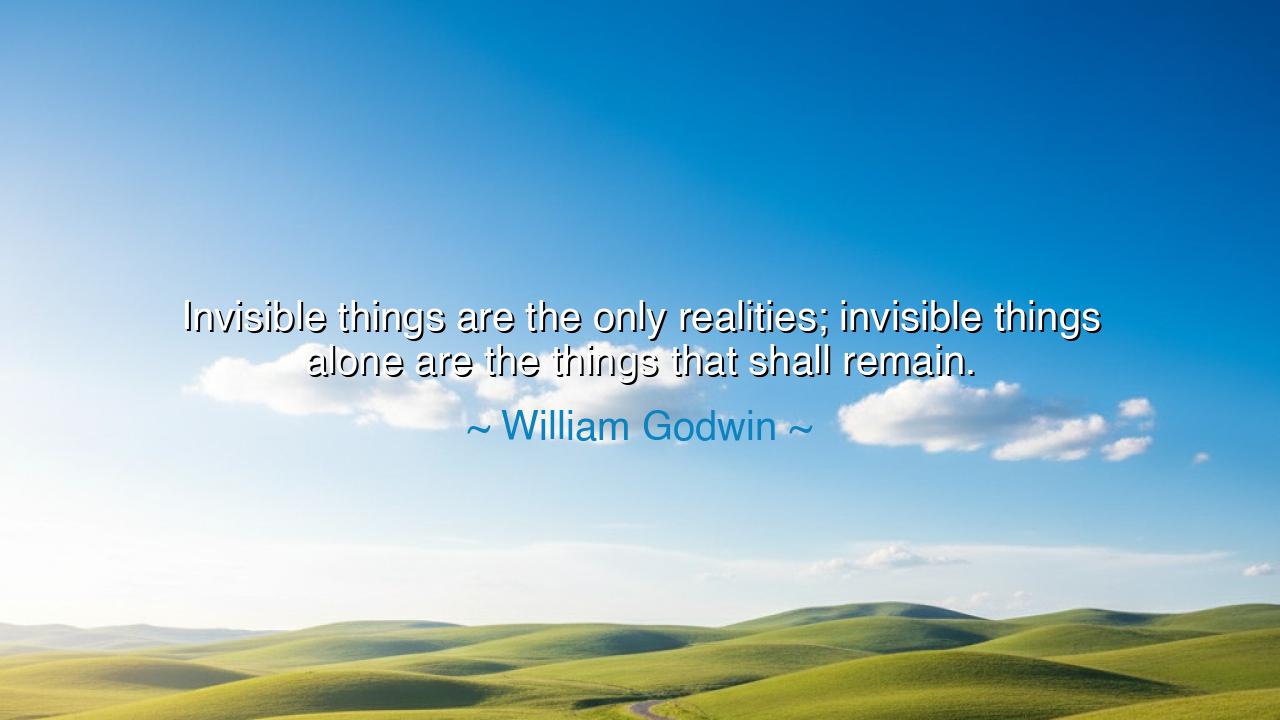
Invisible things are the only realities; invisible things alone
Invisible things are the only realities; invisible things alone are the things that shall remain.






“Invisible things are the only realities; invisible things alone are the things that shall remain.” — thus wrote William Godwin, philosopher, reformer, and father of Mary Shelley, whose Frankenstein would echo this very thought in another form. In these words, Godwin lifts the veil from the surface of the world and calls us to see beyond what the eyes perceive. For he speaks of that which is eternal, not in stone or flesh, but in spirit, thought, and truth. What we can touch crumbles; what we can see fades; what we can measure dies. But the invisible — love, justice, courage, faith, imagination — endures beyond decay.
The origin of this insight arises from Godwin’s belief in the supremacy of reason and moral truth. Living in the tumultuous age of revolution and enlightenment, he sought meaning not in institutions or power, but in ideas — forces unseen that move the destiny of mankind. He perceived that every visible act begins first as an invisible impulse, that behind every kingdom, invention, or poem lies the silent spark of thought. Thus he proclaimed that the unseen is not lesser but greater; that the invisible is the womb of creation, the unseen flame that shapes the visible world.
When Godwin declares that “invisible things alone shall remain,” he speaks as one who has looked upon the fragility of mortal life and found in it the reflection of eternity. The body ages; the monuments crumble; the empires fall. Yet love, once kindled, continues in the hearts of others; knowledge, once born, ripples through generations; virtue, once lived, becomes a beacon in the conscience of mankind. The visible world is the shadow, but the invisible — truth, soul, memory — is the light that casts it.
Consider the story of Mahatma Gandhi, who carried no weapons, held no throne, and commanded no army. The world could see only his frail body wrapped in simple cloth, his bare feet treading the dust. Yet within him burned an invisible force — faith in nonviolence, the moral power of truth. That invisible conviction shook the might of an empire and inspired millions long after his voice was silenced. His body perished, but his ideals remain, living proof of Godwin’s wisdom: that what is unseen is what truly lasts.
So too in every human life, the greatest treasures cannot be held in the hand. Friendship, integrity, hope — these are invisible riches, yet they outlive gold and glory. The modern world, dazzled by material splendor, forgets this truth. We chase what gleams, and neglect what glows. We build higher towers and stronger machines, yet our spirits grow frail for lack of unseen nourishment. Godwin’s words rise as both warning and remedy: seek not permanence in things that rust and rot, but in the unseen virtues that no thief can steal and no time can erode.
There is a sacred irony in this — that the invisible, though unseen, is the most real, while the visible, though solid, is fleeting illusion. The ancients knew this well. The Stoics called it the Logos; the Hindus, the Atman; the mystics, the Divine Breath. Every great soul who has looked beyond the veil has found the same truth written upon the winds: that spirit is eternal, and matter only its momentary form. To live wisely is to learn to see with the inner eye, to recognize in kindness the face of eternity, in truth the echo of the divine.
The lesson, then, is both humbling and empowering. Do not measure your life by what you possess or how the world remembers you. Build instead what cannot be seen but will never die — compassion, wisdom, faith, and love. Speak truth even when no one hears, for truth itself endures. Offer kindness even when forgotten, for it will live in the unseen current of the human heart. In this way, you plant seeds in the soil of eternity, not in the dust of time.
So let Godwin’s words be a compass for your days: “Invisible things are the only realities.” When the world tempts you with the glitter of the transient, remember the silent and the eternal. Seek what the eyes cannot see but the soul can feel — and you shall live among realities that do not fade, but endure forever. For though all else passes, the unseen truth abides, radiant and indestructible, at the heart of all that is.






AAdministratorAdministrator
Welcome, honored guests. Please leave a comment, we will respond soon